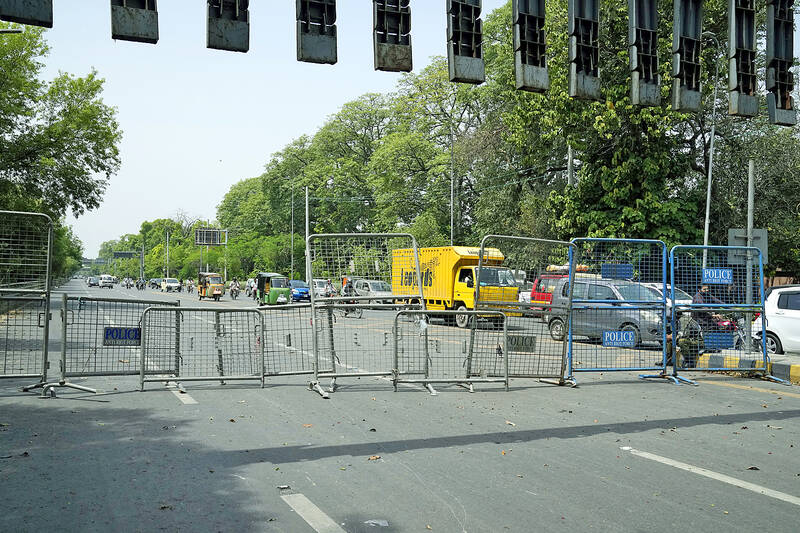Police on Wednesday surrounded the home of former Pakistani prime minister Imran Khan, claiming he was sheltering dozens of people allegedly involved in violent protests over his recent detention.
The police deployment was likely to anger Khan’s many followers, and raised concerns about more clashes between them and the security forces.
Last week, Khan supporters had attacked public property and military installations after he was dragged out of a courtroom and detained.

Photo: AP
The popular opposition leader was released over the weekend and returned to his home in an upscale district of Lahore, Pakistan’s second-largest city and the capital of the Punjab region.
On Wednesday, Khan took to Twitter after 200 police officers surrounded the house and a prison van appeared on the scene.
“Probably my last tweet before my next arrest,” Khan wrote. “Police have surrounded my house.”
Earlier on Wednesday, Amir Mir, a spokesman for the Punjab provincial government, said Khan has 24 hours to hand over 40 suspects allegedly hiding at his home or face a police raid.
Mir told a news conference that so far 3,400 suspects have been arrested and that more raids are planned.
Pakistani authorities have said they would prosecute civilians involved in recent anti-government protests in military courts.
Pakistani army chief General Asim Munir, said in a speech to troops that “recently planned and orchestrated tragic incidents will never be allowed again at any cost.”
The advocacy group Amnesty International and the Human Rights Commission of Pakistan said they were alarmed by the government’s plan.
Dinushika Dissanayake, Amnesty’s deputy regional director for South Asia, said that trying civilians in military courts is contrary to international law.
Military trials in Pakistan are usually held behind closed doors, depriving civilians of some of their basic rights, including contracting a lawyer of their choice.
A wave of violence had engulfed Pakistan’s capital and other urban areas following Khan’s dramatic arrest from a courtroom. Khan supporters torched buildings and vehicles, and attacked police and military personnel and facilities. Ten people were killed in the clashes and more than 4,000 were arrested.
The Pakistani Supreme Court later ordered Khan’s release and criticized the way he was arrested.
On Wednesday, a top court in Islamabad extended Khan’s bail and protection from arrest until the end of the month.
However, his legal team fears he might be arrested in old cases.
Khan, 70, was ousted by a non-confidence vote in parliament last year. He is facing more than 100 cases, mainly on charges of inciting people to violence, threatening officials and defying a ban on rallies. He also faces a graft case along with his wife.

THE TRAGEDY OF PUNCH: Footage of the seven-month-old Japanese macaque has gone viral online after he was rejected by his mother and formed a bond with a soft toy A baby monkey in Japan has captured hearts around the world after videos of him being bullied by other monkeys and rejected by his mother went viral last week. Punch, a Japanese macaque, was born in July last year at Ichikawa City Zoo. He has drawn international attention after zookeepers gave him a stuffed orangutan toy after he was abandoned by his mother. Without maternal guidance to help him integrate, Punch has turned to the toy for comfort. He has been filmed multiple times being dragged and chased by older Japanese macaques inside the enclosure. Early clips showed him wandering alone with

South Korea would soon no longer be one of the few countries where Google Maps does not work properly, after its security-conscious government reversed a two-decade stance to approve the export of high-precision map data to overseas servers. The approval was made “on the condition that strict security requirements are met,” the South Korean Ministry of Land, Infrastructure and Transport said. Those conditions include blurring military and other sensitive security-related facilities, as well as restricting longitude and latitude coordinates for South Korean territory on products such as Google Maps and Google Earth, it said. The decision is expected to hurt Naver and Kakao

Australian Prime Minister Anthony Albanese yesterday said he did not take his security for granted, after he was evacuated from his residence for several hours following a bomb threat sent to a Chinese dance group. Albanese was evacuated from his Canberra residence late on Tuesday following the threat, and returned a few hours later after nothing suspicious was found. The bomb scare was among several e-mails threatening Albanese sent to a representative of Shen Yun, a classical Chinese dance troupe banned in China that is due to perform in Australia this month, a spokesperson for the group said in a statement. The e-mail

‘OCCUPATION’: Hong Kong said it had lodged ‘stern protests’ with Panama’s consulate, and would ‘staunchly support’ the rights and interests of Hong Kong companies Panamanian President Jose Raul Mulino on Monday ordered the temporary occupation of two ports run by a unit of CK Hutchison Holdings Ltd following the Supreme Court’s ruling against the firm’s concession, escalating a dispute that has become a proxy battle between the US and China in Latin America. Mulino said in a speech that the administration and operation of the two ports on the strategic Panama Canal is to revert to the country’s National Maritime Authority to ensure their uninterrupted, safe and efficient operation. The occupation covers movable equipment at the ports and does not mean a definitive loss of